Sir John Monash, Personal Files Book 16, 1 August - 3 September 1917, Part 4

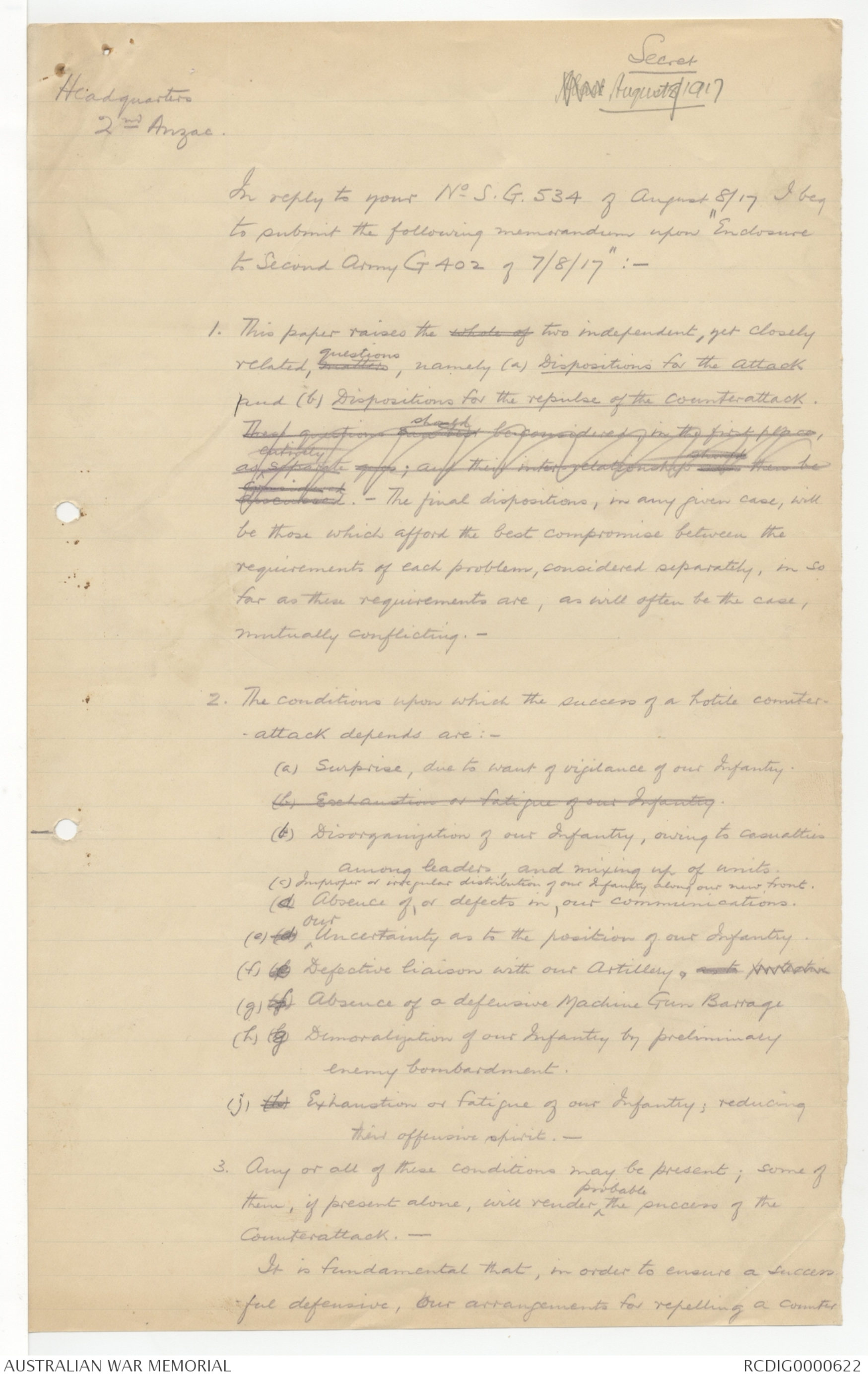
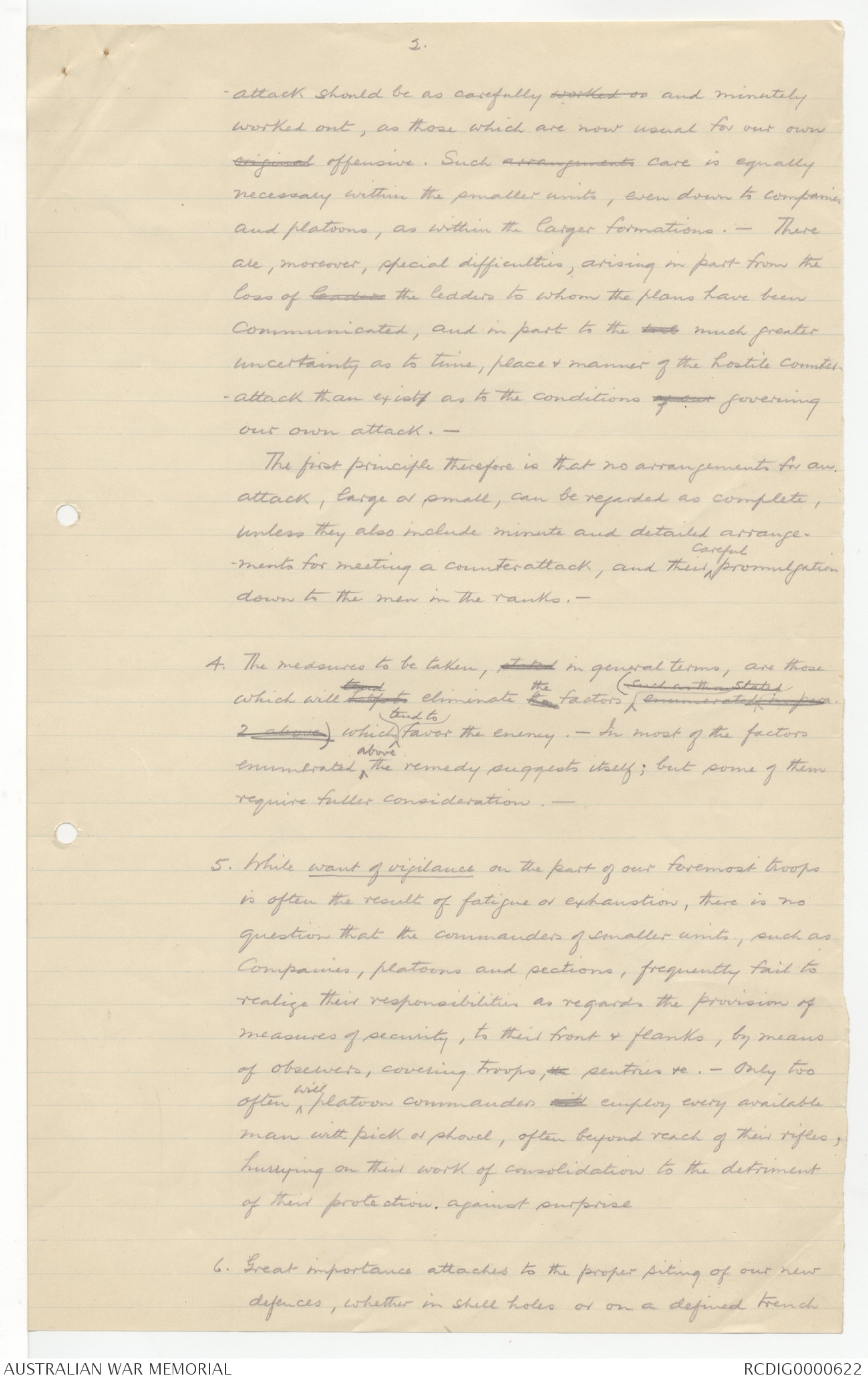
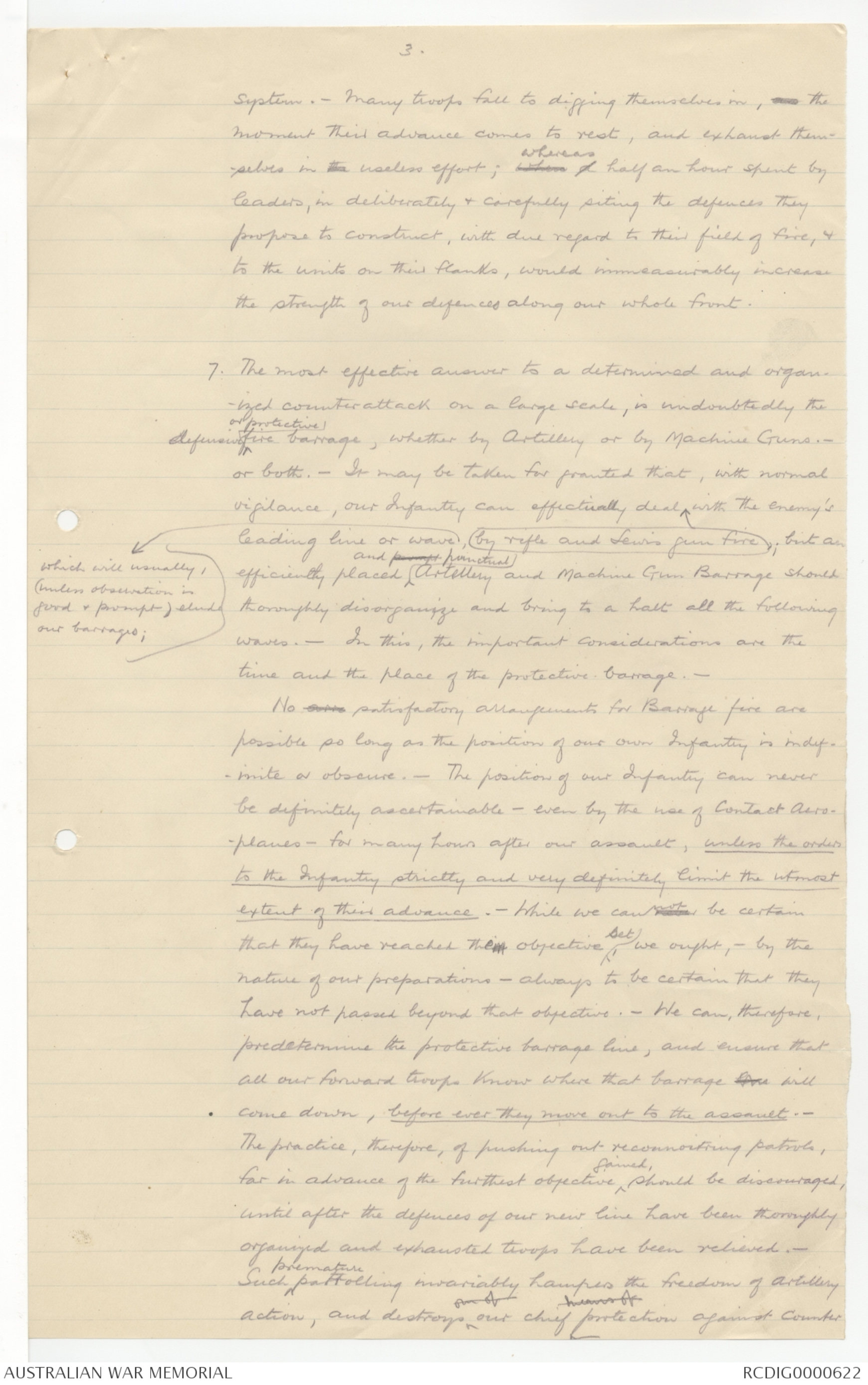
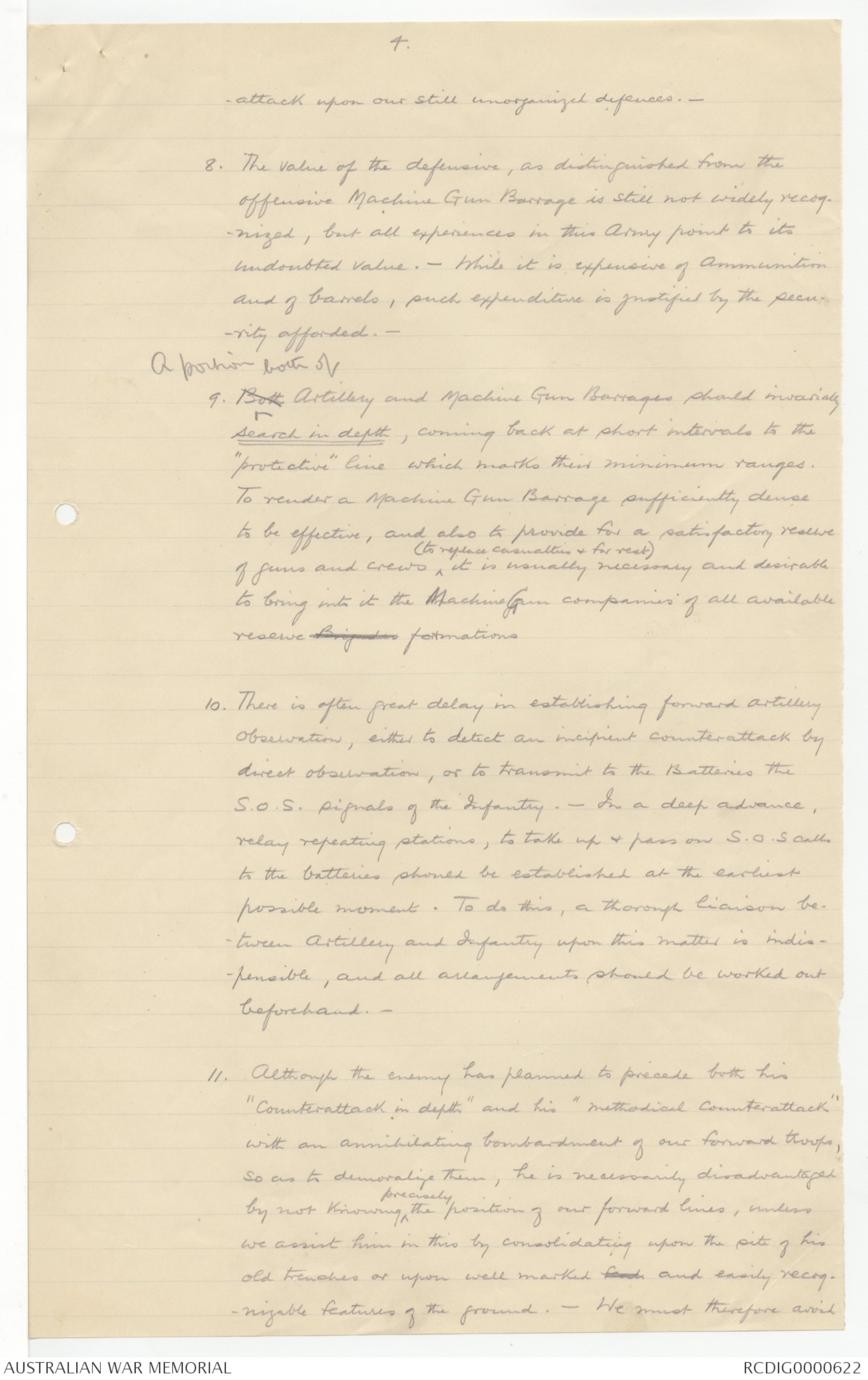
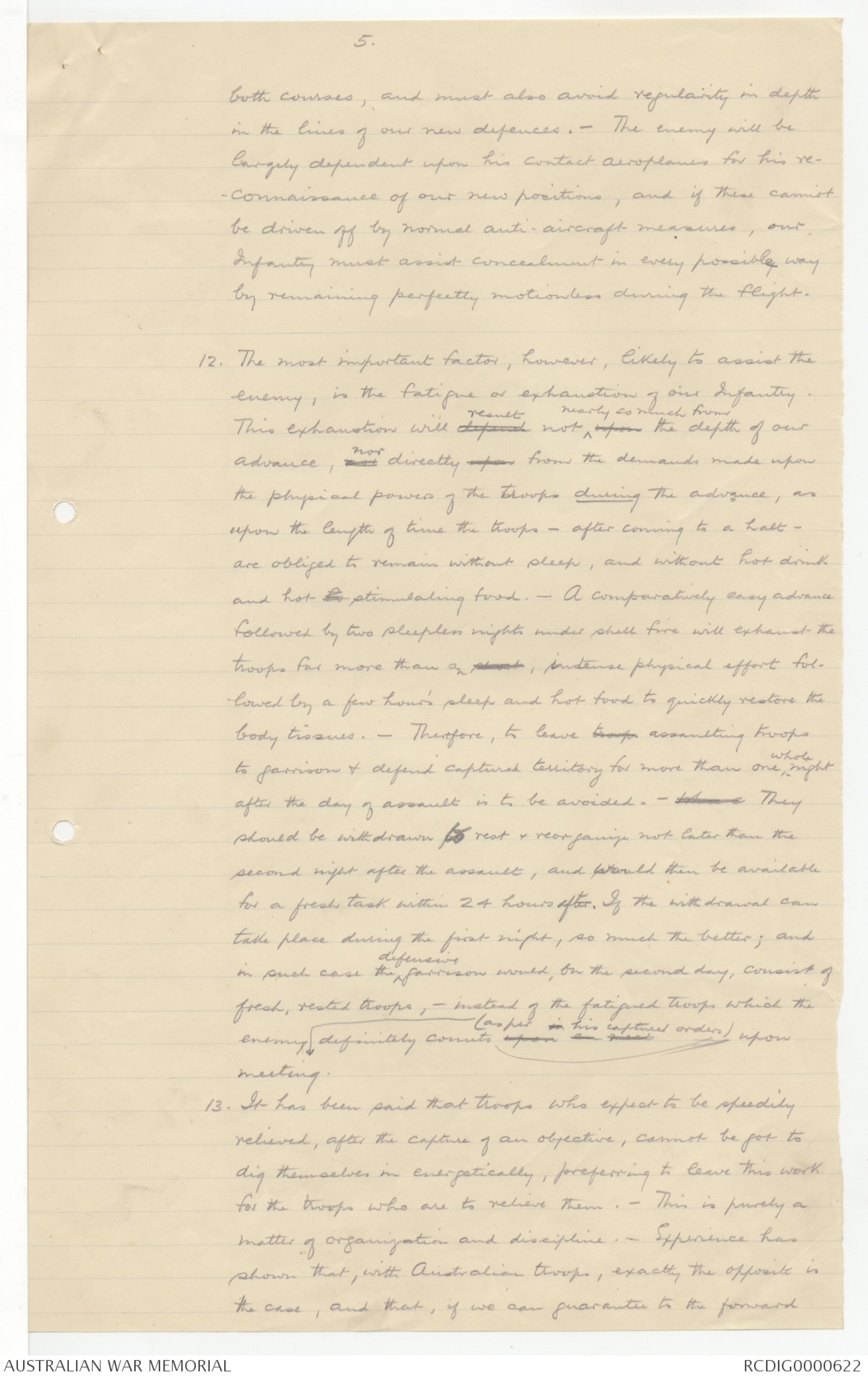
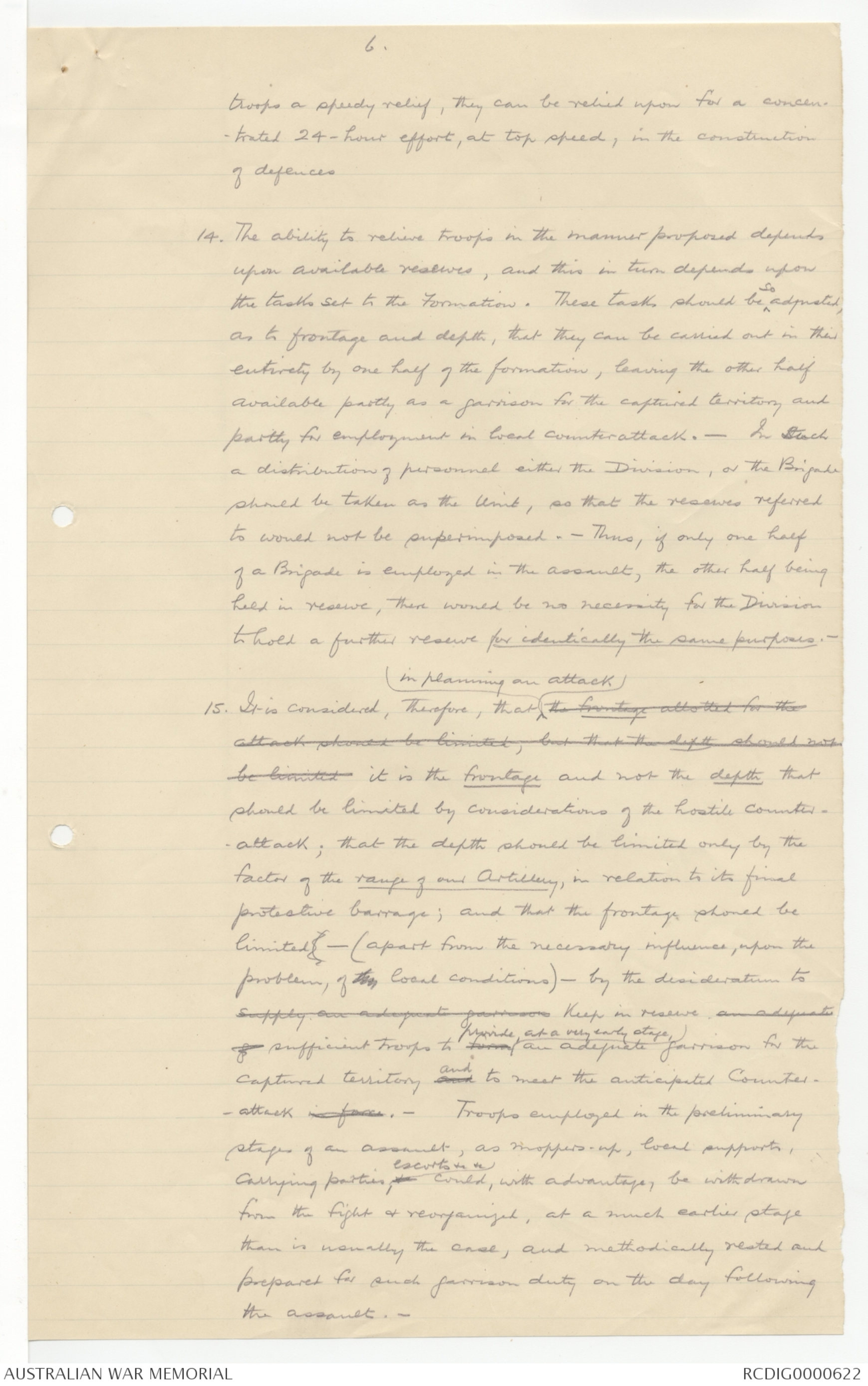
HEADQUARTERS
G43/32.
THIRD AUSTRALIAN DIVISION
THIRD AUSTRALIAN DIVISION.
Divisional Headquarters.
7th. August, 1917.
AQ.
C.R.A.
C.R.R.
9th. Aust. Inf. Bde.
10th. do.
11th. do.
3rd. Aust. Pioneer Bn. -
Camp Commandant. -
A Conference of Infantry Brigade Commanders will
be held at Divisional Headquarters at 10a.m. on Thursday. August
9th. --
Brigade Majors and Staff Captains; also C.O. and
Adjutant Pioneer Bn. will attend.
Commanders will be prepared to bring forward all
questions and difficulties relating to personnel, equipment,
interior economy and re-organisation generally. -
Camp Commandant will arrange for transport from
more distant Headquarters.
A Conference on questions of training and general
tactical questions, to be attended by the above, as well as by
all Battalion Commanders and Adjutants, will be held at a later
date to be notified.
C.R.A. and C.R.E., although not directly affected
by the Conference on the 9th., are invited to be present.
A car will be at the 11th. Bde. Headquarters at
9.30 a.m. xxx Other Officers will make their own arrangements
for coming in to Divisional Headquarters.
EUJ
Lieut- Colonel.-
General Staff.
Secret
xxx August 8/1917
Headquarters
2nd Anzac.
In reply to your No S.G.534 of August 8/17 I beg
to submit the following memorandum upon "Enclosure
to Second Army G402 of 7/8/17" :-
1. This paper raises the whole of two independent, yet closely
related matters questions, namely (a) Dispositions for the Attack
and (b) Dispositions for the repulse of the counterattack.These questions should be considered in the first placeas ^entirely separate ques; and their inter-relationship should then beconsistent. - The final dispositions, in any given case, will
be those which afford the best compromise between the
requirements of each problem, considered separately, in so
far as these requirements are, as will often be the case,
mutually conflicting. -
2. The conditions upon which the success of a hotile counterattack
depends are:-
(a) Surprise, due to want of vigilance of our Infantry.(b) Exhaustion or fatigue of our Infantry.
(b) Disorganisation of our Infantry, owing to casualties
among leaders,, ad mixing up of units.
(c) Improper or irregular distribution of our Infantry along our new front.
(d) Absence of, or defects in, out communications.
(e) (d) ^Our Uncertainty as to the position of our Infantry.
(f) (e) Defective liaison with our Artillery. xxxx xxxxxxxxx
(g) (f) Absence of a defensive Machine Gun Barrage
(h) (g) Demoralization of our Infantry by preliminary
enemy bombardment.
(j) (h) Exhaustion or fatigue of our Infantry, reducing
their offensive spirit. -
3. Any or all of these conditions may be present; some of
them, if present alone, will render ^probable the success of the
counterattack. -
It is fundamental that, in order to ensure a successful
defensive, our arrangements for repelling a counter
2.
attack should be as carefully worked on and minutely
worked out, as those which are now usual for our ownoriginal offensive. Such arrangements care is equally
necessary written the smaller units, even down to companies
and platoons, as written the larger formations. - There
are, moreover, special difficulties, arising in part from the
loss of leader the leaders to whom the plans have been
communicated, and in part to the xxx much greater
uncertainty as to time, place and manner of the hostile counterattack
then exists as to the conditions xxxx governing
our own attack . -
The first principle therefore is that no arrangements for an
attack, large or small, can be regarded as complete,
unless they also include minute and detailed arrangements
for meeting a counterattack, and their ^careful promulgation
down to the men in the ranks. -
4. The measures to be taken, stated in general terms, are those
which will xxx left to eliminate them the factors ^(such as stated xxxxxxxxx2 above) which ^tend to favor the enemy. - In most of the factors
enumerated ^ above The remedy suggests itself ; but some of them
require fuller consideration. -
5. While want of vigilance on the part of our foremost troops
is often the result of fatigue or exhaustion, there is no
question that the commanders of smaller units, such as
companies, platoons and sections, frequently fail to
realize their responsibilities as regards the provision of
measures of security, to their front & flanks, by means of observers, covering troops, we sentries re. - Only too
often ^ will platoon commanders will employ every available
man with pick or shovel, often beyond reach of their rifles,
hurrying on the work of consolidation to the detriment
of their protection against surprise
6. Great importance attached to the proper siting of our new
defences, whether in shell holes or on a defined trench
3.
system. - Many troops fall to digging themselves in, xxx the
moment their advance comes to rest, and exhaust themselves
in the useless effort; when whereas a half an hour spent by
leaders , in deliberately & carefully siting the defences they
propose to construct, with due regard to their field of fire, &
to the units on their flanks, would immeasurably increase
the strength of our defences along our whole front.
7. The most effective answer to a determined and organized
counterattack on a large scale, is undoubtedly the
defensive ^ or protective fire barrage, whether by Artillery or by Machine Guns. -
or both. - It may be taken for granted that, with normal
vigilance, our Infantry can effectively deal by rifle and Lewis gun fire with the enemy's
leading line or wave;
[*which will usually
(under observation is
good & prompt) elude
our barrage;*] but an
efficiently placed ^ and practiced Artillery and Machine Gun Barrage should
thoroughly disorganize and bring to a halt all the following
waves. - In this, the important consideration are the
time and the place of the protective barrage. -
No xxxx satisfactory arrangements for Barrage fire are
possible so long as the position of our own Infantry can never
be definitively be ascertainable - even by the use of contact aeroplanes -
for may hours after our assault, unless the orders
to the Infantry strictly and very definitely limit the utmost
extent of their advance . - While we can not xxx be certain
that they have reached the objective ^set, we ought , - by the
nature of our preparations - always to be certain that they
have not passed beyond that objective . - He can, therefore,
predetermine the protective barrage line, and ensure that
all our forward troops know where that barrage xxx will
come down, before ever they move out to the assault. -
The practice, therefore, of pushing out reconnoitring patrols,
far in advance of the furthest objective ^ gained should be discouraged,
until after the defences of our new line have been thoroughly
orgainzed and exhausted troops have bee relieved. -
Such ^ premature patrolling invariably hampers the freedom of artillery
action, and destroys ^ out by our chief means of protection against counterattack
4.
upon our still unorganized defences. -
8. The value of the defensive, as distinguished from the
offensive Machine Gun Barrage is still widely recognized,
but all experiences in this Army point to its
undoubted value. - While it is expensive of Ammunition
and of barrels, such expenditure is justified by the security
afforded. -
9. Both A portion both of Artillery and Machine Gun Barrages should invariably
search in depth , coming back at short intervals to the
"protective" line which marks their minimum ranges.
To render a Machine Gun Barrage sufficiently dense
to be effective, and also to provide for a satisfactory reserve
of guns and crews^ (to replace casualties & for rest) it is usually necessary and desirable
to bring into it the Machine Gun companies of all available
reserve Brigades formations.
10. There is often great delay in establishing forward artillery
observation, either to detect an incipient counterattack by
direct observation, or to transmit to the Batteries the
S.O.S signals of the Infantry. - In a deep advance,
relay repeating stations, to take up & pass on S.O.S calls
to the batteries should be established at the earliest
possible moment. To do this, a thorough liaison between
Artillery and Infantry upon this matter is indispensible,
and all arrangements should be worked out
beforehand. -
11. Although the enemy has planned to precede both his
"Counterattack in depth'' and his ''methodical Counterattack''
with an annihilating bombardment of our forward troops,
so as to demoralize them, he is necessarily disadvantaged
by not knowing ^ precisely the position of our forward lines, unless
we assist him in this by consolidating upon the site of his
old trenches or upon well marked feat and easily recognizable
features of the ground. - We must therefore avoid
5.
both courses, and must also avoid regularity in depth
in the lines of our new defences.- The enemy will be
largely dependent upon his contact aeroplanes for his reconnaissance
of our new positions, and if these cannot
be driven off by normal anti-aircraft measures, our
Infantry must assist concealment in every possible way
by remaining perfectly motionless during the flight.
12. The most important factor, however, likely to assist the
enemy, is the fatigue or exhaustion of our Infantry.
This exhaustion will depend result not ^ nearly so much from upon the depth of our
advance, not nor directly upon from the demands made upon
the physical powers of the troops during the advance, as
upon the length of time the troops - after coming to a halt -
are obliged to remain without sleep, and without hot drink
and hot foo stimulating food. A comparatively easy advance
followed by two sleepless nights under shell fire will exhaust the
troops far more than an short, intense physical effort followed
by a few hour's sleep and hot food to quickly restore the
body tissues. - Therefore, to leave troops assaulting troops
to garrison & defend captured territory for more than one ^ whole night
after the day of assault is to be avoided. - xxxx They
should be withdrawn to rest & reorganize not later than the
second night after the assault, and would then be available
for a fresh task within 24 hours after. If the withdrawal can
take place during the first night, so much the better; and
in such case the ^defensive garrison would, on the second day, consist of
fresh, rested troops, - instead of the fatigued troops which the
enemy definitely counts upon an xxx (as per his captured orders) upon
meeting.
13. It has been said that troops who effect to be speedily
relieved, after the capture of an objective, cannot be got to
dig themselves in energetically, preferring to leave this work
for the troops who are to relieve them. - This is purely a
matter of organization and discipline. - Experience has
shown that, with Australian troops, exactly the opposite is
the case, and that, if we can guarantee to the forward
6.
troops a speedy relief, the can be relied upon for a concentrated
24-hour effort, at top speed, in the construction
of defences.
14. The ability to relieve troops in the manner proposed depends
upon available reserves, and this in turn depends upon
the tasks set in the formation. These tasks should be ^ so adjusted,
as to frontage and depth, that they can be carried out in their
entirety by one half of the formation, leave the other half
available partly as a garrison for the captured territory and
partly for employment in event counterattack. - In such
a distribution of personnel either the Division, or the Brigade
should be taken as the Unit, so that the reserves referred
to would not be superimposed. - Thus, if only one half
of a Brigade is employed in the assault, the other half being
held in reserve, then would be no necessity for the Division
to hold a further reserve for identically the same purposes. -
15. It is considered, therefore, that ^ in planning an attack the frontage allotted for theattack should be limited, but that the depth should notbe limited it is the frontage and not the depth that
should be limited by consideration of the hostile counterattack;
that the depth should be limited only by the
factor of the range of our Artillery, in relation to its final
protective barrage; and that the frontage should be
limited ( - (apart from the necessary influence , upon the
problem, of xx local conditions) - by the desideration tosupply an adequate garrison Keep in reserve an adequateg sufficient troops to ^provide , at an early stage form an adequate garrison for the
captured territory ^and xxx to meet the anticipated counterattack
in force. - Troops employed in the preliminary
stages of an assault, as moppers-up, local supports,
carrying parties, x ^ escorts could, with advantage, be withdrawn
from the fight & reorganized, at a much earlier stage
than is usually the case, and methodically rested and
prepared for such garrison on the day following
the assaults. -
 Jasmine Hatharasinghe
Jasmine HatharasingheThis transcription item is now locked to you for editing. To release the lock either Save your changes or Cancel.
This lock will be automatically released after 60 minutes of inactivity.